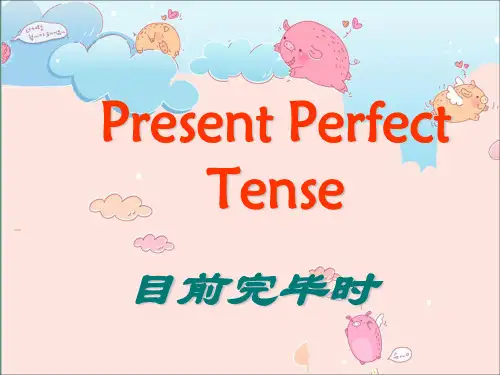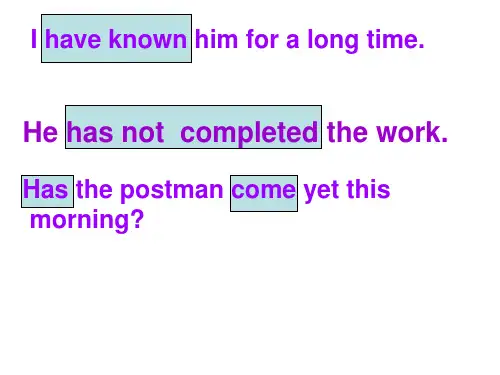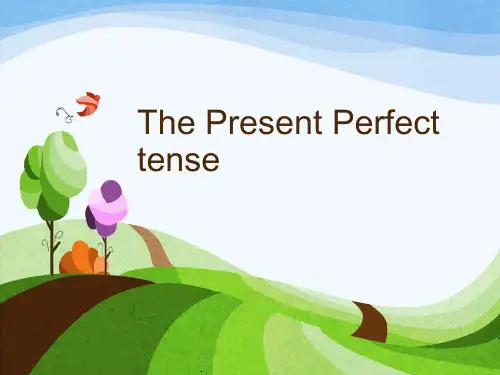- 1、下载文档前请自行甄别文档内容的完整性,平台不提供额外的编辑、内容补充、找答案等附加服务。
- 2、"仅部分预览"的文档,不可在线预览部分如存在完整性等问题,可反馈申请退款(可完整预览的文档不适用该条件!)。
- 3、如文档侵犯您的权益,请联系客服反馈,我们会尽快为您处理(人工客服工作时间:9:00-18:30)。
The boy has already come here.
I haven’t heard anything from him yet. Notes 1: 我们肯定句中用 already ,
否定句或疑问句中用yet.
用never, ever, already, yet, 填空 never seen him before, so I 1. I have _______ have no idea about him. already finished his 2. Jack has _________ homework since an hour ago. 3. Mr. Wang hasn’t dismissed the idea yet ____. ever 4. “Have you ________ seen the film?” never seen it.” “No, I have ________ yet 5. “Has the bus left _______?” “Yes, it already left.” has _________
Summary (5):
当某个行为发生的确切时间不很清楚或 不重要. 出现下面的这些时间表达方式
我们用现在完成时:
already, ever, for, just, lately, never,
recently, since, yet, so far,by的短语, in the past/last+段时间
我们用现在完成时表示反复发生的动作。
1.You don't need to describe her. I ___ her several times. A. had met B. have met C. met D. meet
I
______________(read) have read
your article three times.
be here be away be dead be married be … keep be on be over have
老约翰已经去世五年多了。
A.Old John has died for more than five years. B.Old John has passed away for more than five years.
我的弟兄参军已有5年了。
A.It is five years since my brother joined the Army. B.My brother has become a soldier for five years. C.My brother has joined the Army for five years.
但是对பைடு நூலகம்在仍有影响的事.
现在完成时 PK 一般过去时:
1. She has cleaned the room. (房子现在是干净的) 1.She cleaned the room. (房子现在是否干净不知道)
现在完成时 PK 一般过去时:
1.现在完成时: 强调动作对现在产生了结
果和影响. 2.一般过去时: 只表示过去的动作和状态. 强调动作. 若有时间状语:yesterday, last
has already opened Eric _____________ (already open) the window.
过去的动作: Eric opened the window. 也与现在相关: The window is open.)
Summary (1):
我们用现在完成时谈论发生在过去,
studied 3.I ______ (study) in Zhentou middle school for three years, but now I’m studying here.
B the recorder? I can’t see it —Where _____ anywhere. — I ____ it right here. But now it’s gone. A. did you put; have put B. have you put; put C. had you put; was putting D. were you putting; put
have just The police __________
finished __________
(just
finish)
searching the area.
have just arrived “I ____________(just arrive) by train.” she said.
Summary (4):
×
Notes 3:
非延续性动词(瞬间动词)在完成时态中 其肯定式不能与表示一段时间的时间状 语连用. eg: come, go, leave, arrive ,buy, borrow,
join, lose, die, marry, begin, start,
finish…
非延续动词
延续动词
come/arrive go/leave die get married join borrow begin /start finish buy
我的爷爷死了三年了。
My grandfather has died for three years.
×
My grandfather has died for three years. My grandfather has been dead for three years. My grandfather died three years ago. It is/has been three years since my grandfather died.
week,…ago, in1980, in October, just now,用一般过去时
wrote 1.Tom _____(write) a letter to his mother last night.
B 2.I bought a new house, but I ___ my old one yet, so at the moment I have two houses. A. didn’t sell B. haven’t sold
A I wonder why he _____ to me recently. She promised to write to me every week. A.hasn’t written B. doesn’t write C. didn’t write D. won’t write
Translate:
Notes 2: for + 段时间 since + 点时间
We haven’t seen him for
two years.
We haven’t seen him since 2002.
1)since +过去一个时间点(如具体的年、 月、日期、钟点、1980, last month, half past six)。 I have been here since 1989. 2) since +一段时间+ ago I have been here since five months ago. 3) since +从句 Great changes have taken place since you left. 4) It is/has been +一段时间+ since从句 It is/has been ten years since I became a student.
高考链接
—The window is dirty.
D — I know. It ________ for weeks.
A. hasn’t cleaned
C. wasn’t cleaned
B. didn’t clean
D. hasn’t been cleaned
Summary (3):
我们用现在完成时谈论刚刚完成的 动作。
the Present Perfect Tense
Form: have/has + done Negative form: have/has not done Question form: Have/Has +主语+done
Look, the window is open. Eric opened the door just now.
I have known him for a long time.
He has not completed the work.
Has the postman come yet this morning?
1. Police in America have stepped up their search for a fifteen-year-old boy. 2. The incident has received great interest due to reports. 3. While we have not dismissed the idea, we are looking into other possibility as well.
第一个空“放”这个动作强调对现 在的影响,“我找不到”第二个空 “放”指过去的一个动作
Summary (2):
我们用现在完成时谈论开始于过去,
并且还持续到现在的事。
I have not seen Justin since last Friday night.
Exercise
has gone Beth isn’t here. She_________(go) to Beijing.










